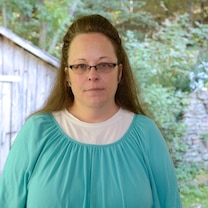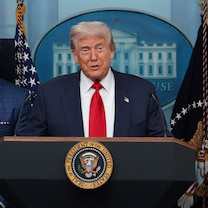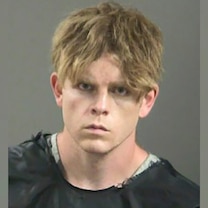Soap, wristbands and scaling the UN: People get creative during final plastic pollution treaty talks

GENEVA -- A Swiss ocean protection group is handing out bars of soap to negotiators working on a global accord to end plastic pollution.
The messaging on the cardboard box from the Geneva-based Gallifrey foundation reads "no dirty tricks, vote for a clean plastics treaty.”
As Thai diplomat Jutha Saovabha walked to the treaty talks Wednesday morning, Gallifrey Foundation spokesperson Laurianne Trimoulla stopped him to chat and handed him a soap. Saovabha said it was a lovely gift and he liked the plastic-free packaging.
Nations are crafting the first global, legally binding treaty on plastics pollution. The meeting at the United Nations office in Geneva is supposed to be the last and people are getting creative to put the pressure on to get a deal done.
Here is a look at what they’re doing:
Trimoulla said they chose soap because Switzerland is known for its cleanliness, and democracy. She said it's a “cheeky” way to deliver a serious message.
The foundation partnered with Friends of the Earth International and the Break Free From Plastic movement to urge delegates to vote on the treaty. Currently, every nation must agree for any proposal to be included in the treaty. If consensus can’t be reached on the last day, the process could become paralyzed. The talks are scheduled to conclude Thursday.
On Wednesday, Trimoulla had about 10 organic soaps left to hand out out of nearly 400. She said many delegates liked the gift, including those from France, Panama, and “even the United States.” The foundation wants the treaty to reduce plastic production, whereas the U.S. supports provisions focused on better waste management and reuse to reduce plastic pollution.
The International Pollutants Elimination Network gave wristbands to UN officials, delegates and plastic waste workers before the talks to measure their exposure to chemicals used to make plastics and show the importance of protecting human health with the treaty. It's releasing a report Wednesday about the findings.
IPEN cochair Pamela Miller said the treaty is “all about oil versus our health.” Most plastic is made from fossil fuels.
Camila Zepeda, of Mexico, wore one. Zepeda is now leading negotiations for Mexico on an article to address problematic plastic products, including single-use plastics and chemicals.
“I had been reading a lot of research. So I was already sort of wary that we’re already exposed to so many chemicals,” she said. “What I was surprised by, is that all over the world, because this study has been carried throughout different regions, we are all being exposed to those added chemicals in plastics. That is concerning.”
The World Wildlife Fund set up a conveyor belt of plastic waste in the plaza in front of the U.N. office Wednesday. A backdrop showed a turtle, dolphin and a person with open mouths, as if the waste was flowing in.
There was a large red button that said “EMERGENCY”, plus a sign that read “PUSH THE BUTTON, STOP THE PLASTIC FLOOD NOW.” The WWF urged delegates to the talks to push the red button and halt the belt, to represent stopping plastic pollution.
Activists from Greenpeace climbed to the top of the buildings at the entrance to the U.N. office in Geneva and unfurled banners shortly after the negotiations began there last week. Greenpeace said it wanted to show the “undue influence” of the fossil fuel industry at the talks. Most plastic is made from fossil fuels.
“We need to make sure all eyes are on Geneva in this critical moment where we have this once in a generation opportunity to create a safe and healthy world for everyone," said Graham Forbes, head of the Greenpeace delegation in Geneva.
The banners read “big oil polluting inside” and “plastics treaty not for sale.” They painted a black strip on the road at the entrance to the U.N. office to represent oil.
Much like in Washington, D.C., industry leaders and company executives are meeting with delegates to answer questions and convey their priorities for the treaty, said Chris Jahn, president and CEO of the American Chemistry Council. There was an event before the talks started to showcase a database created by industry to improve transparency about chemical additives in plastics.
“It's shoe leather lobbying and informal personal engagements, where they need an answer to a question quickly and we provide it to them,” Jahn said. “We’re happy to provide information when it’s useful and we’ll be here as long as we need to, to hopefully get a deal.”
Benjamin Von Wong, a Canadian artist and activist, is heaping piles of plastic waste onto a large sculpture in front of the U.N. office. Delegates to the treaty talks pass by the sculpture daily in a reminder of their responsibility to solve the plastic pollution crisis.
It’s his take on the famous sculpture by Auguste Rodin, “The Thinker” in Paris. There is a male figure in deep thought, like Rodin depicted. But instead of sitting atop a rock, Von Wong’s figure sits atop Mother Earth while cradling a baby and clutching plastic bottles. A strand of DNA intertwines them to highlight the health impacts of plastic pollution.
On Wednesday, Von Wong added more plastic waste to cover Mother Earth.
___
The Associated Press’ climate and environmental coverage receives financial support from multiple private foundations. AP is solely responsible for all content. Find AP’s standards for working with philanthropies, a list of supporters and funded coverage areas at AP.org.
ABC News








